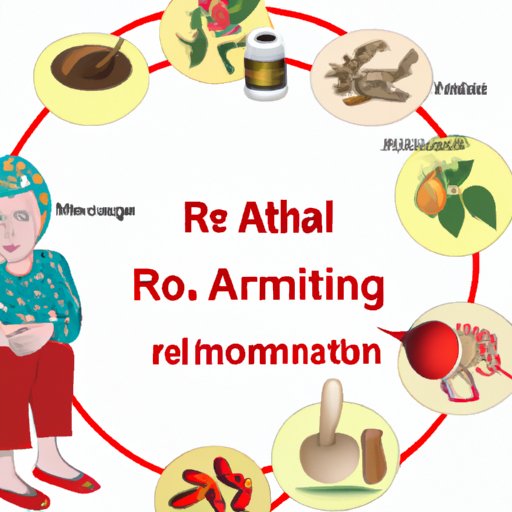Introduction
Rheumatoid arthritis (RA) is an autoimmune disorder that causes inflammation of the joints, resulting in pain, stiffness, and swelling. It can affect people of any age, but it is most common among adults aged 40 and older. Although there is no cure for RA, there are several treatments available to manage the symptoms and improve quality of life.
The purpose of this article is to provide a comprehensive overview of the various treatments available for RA. We will discuss how lifestyle changes, such as following a healthy diet plan and exercising regularly, can help reduce inflammation and ease joint pain. Additionally, we will explore the use of heat and cold therapy, medications, natural remedies, and physical or occupational therapy to help manage RA symptoms.
Understanding the Symptoms of Rheumatoid Arthritis
RA typically affects the hands, feet, wrists, elbows, shoulders, neck, and jaw. Common symptoms include joint pain, stiffness, swelling, and tenderness. Other symptoms may include fatigue, fever, weight loss, and dry eyes or mouth. In some cases, RA can also cause damage to the organs, including the heart, lungs, and eyes.
If you suspect you have RA, it is important to seek medical attention right away. Your doctor will conduct a physical exam and order blood tests or imaging scans to confirm the diagnosis. Once the diagnosis is confirmed, your doctor will work with you to develop a treatment plan that works best for you.

Follow a Healthy Diet Plan to Reduce Inflammation
Following a healthy diet plan is essential for managing RA symptoms. Eating a balanced diet rich in fresh fruits, vegetables, whole grains, lean proteins, and healthy fats can help reduce inflammation and improve overall health. Additionally, avoiding processed foods, refined sugars, and saturated fats can help reduce inflammation and prevent flare-ups.
In addition to eating a balanced diet, certain anti-inflammatory foods may also be beneficial for RA. These include fatty fish, such as salmon and tuna, which are high in omega-3 fatty acids. Other anti-inflammatory foods include leafy greens, nuts, seeds, ginger, and turmeric.

Exercise Regularly to Ease Joint Pain
Regular exercise is another important factor in managing RA symptoms. Exercise helps keep the muscles strong, which can help protect the joints. Low-impact activities, such as walking, swimming, yoga, and tai chi, are particularly beneficial for those with RA. Additionally, stretching exercises can help improve range of motion and reduce stiffness.
It is important to talk to your doctor before starting any exercise program. They can recommend the best type of exercise for your particular condition and provide guidance on how to safely perform the exercises.

Use Heat and Cold Therapy for Relief
Heat and cold therapy are two simple yet effective ways to ease joint pain associated with RA. Heat therapy, such as hot baths, heating pads, or paraffin wax baths, can help relieve stiffness and pain. Cold therapy, such as ice packs or cold compresses, can help reduce swelling and inflammation.
It is important to note that heat and cold therapy should not be used simultaneously. Always start with one or the other and then switch to the other after a few minutes. Additionally, never apply heat or cold directly to the skin; always use a towel or cloth to protect the skin.

Utilize Medications for Pain Management
Medications are often used to manage RA symptoms. Nonsteroidal anti-inflammatory drugs (NSAIDs) can help reduce pain and inflammation. Corticosteroids, such as prednisone, can also help reduce inflammation. Disease-modifying antirheumatic drugs (DMARDs) can slow the progression of RA and reduce long-term disability.
It is important to speak to your doctor before taking any medication. Some medications can cause side effects, such as nausea, vomiting, stomach pain, and headaches. Additionally, some medications may interact with other medications, so it is important to tell your doctor about all medications you are currently taking.
Try Natural Remedies for Rheumatoid Arthritis
Many people with RA find relief from natural remedies, such as herbal remedies and supplements. Herbal remedies, such as turmeric, ginger, and boswellia, have been shown to reduce inflammation and ease joint pain. Supplements, such as fish oil and glucosamine, can also be beneficial for reducing inflammation and improving joint mobility.
It is important to speak to your doctor before taking any herbal remedy or supplement. Some may interact with medications or have side effects, so it is important to make sure they are safe for you to take.
Participate in Physical or Occupational Therapy
Physical or occupational therapy can be beneficial for those with RA. The goal of these therapies is to help improve strength, flexibility, and range of motion. Your therapist will work with you to develop an individualized program that includes stretching and strengthening exercises, as well as strategies for daily living.
These therapies can also help reduce fatigue and improve overall quality of life. Participating in physical or occupational therapy can help you learn to manage your condition and live a more active and fulfilling life.
Conclusion
RA is a chronic condition that can cause pain, stiffness, and swelling. While there is no cure, there are several treatments available to help manage the symptoms and improve quality of life. These include following a healthy diet plan, exercising regularly, using heat and cold therapy, taking medications, trying natural remedies, and participating in physical or occupational therapy.
If you think you may have RA, it is important to speak to your doctor. They can help diagnose the condition and develop a treatment plan that works best for you. With the right treatment plan, you can learn to manage your condition and live a more active and fulfilling life.
For more information about RA and its treatments, visit the Arthritis Foundation website.
(Note: Is this article not meeting your expectations? Do you have knowledge or insights to share? Unlock new opportunities and expand your reach by joining our authors team. Click Registration to join us and share your expertise with our readers.)
